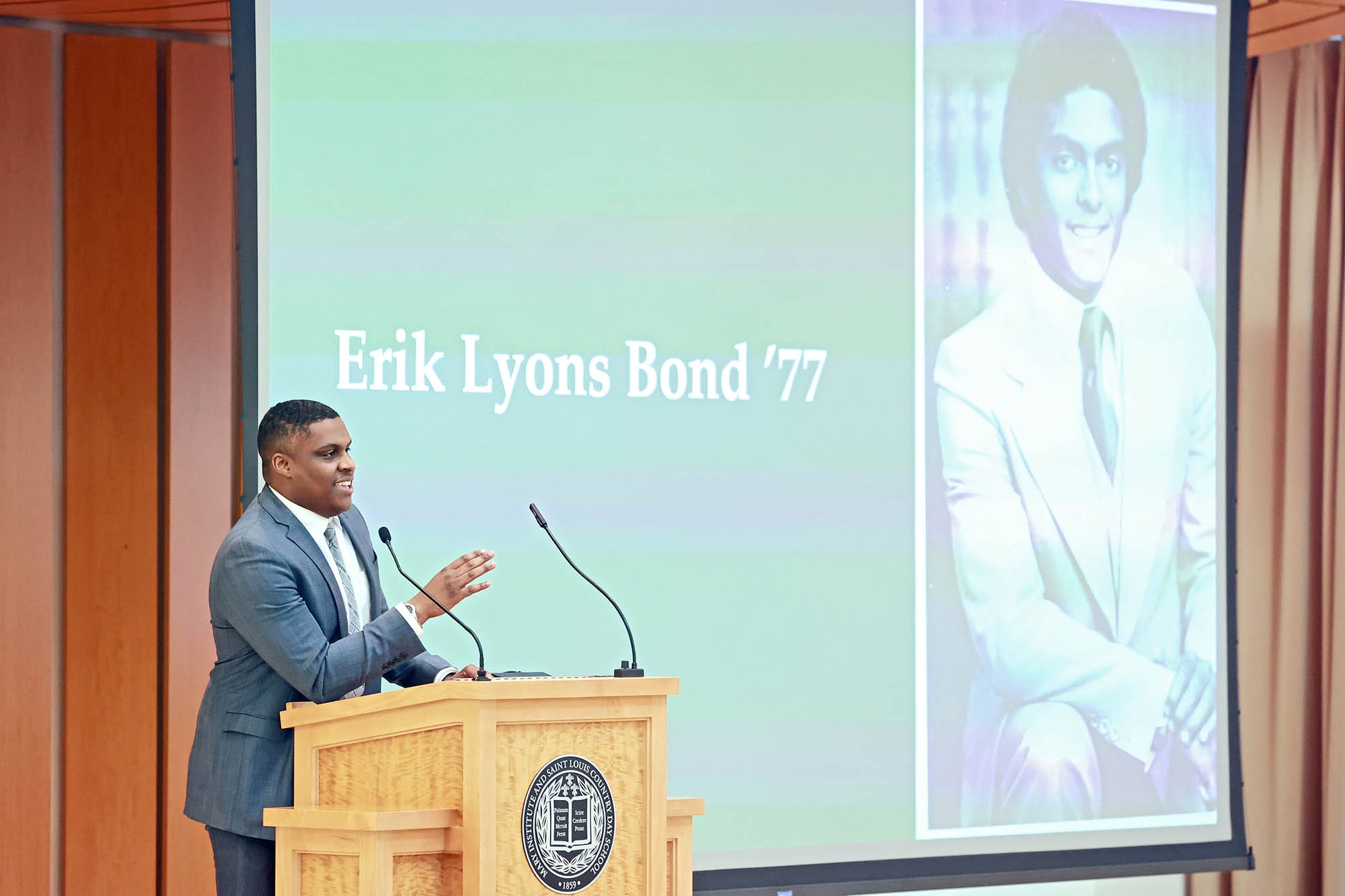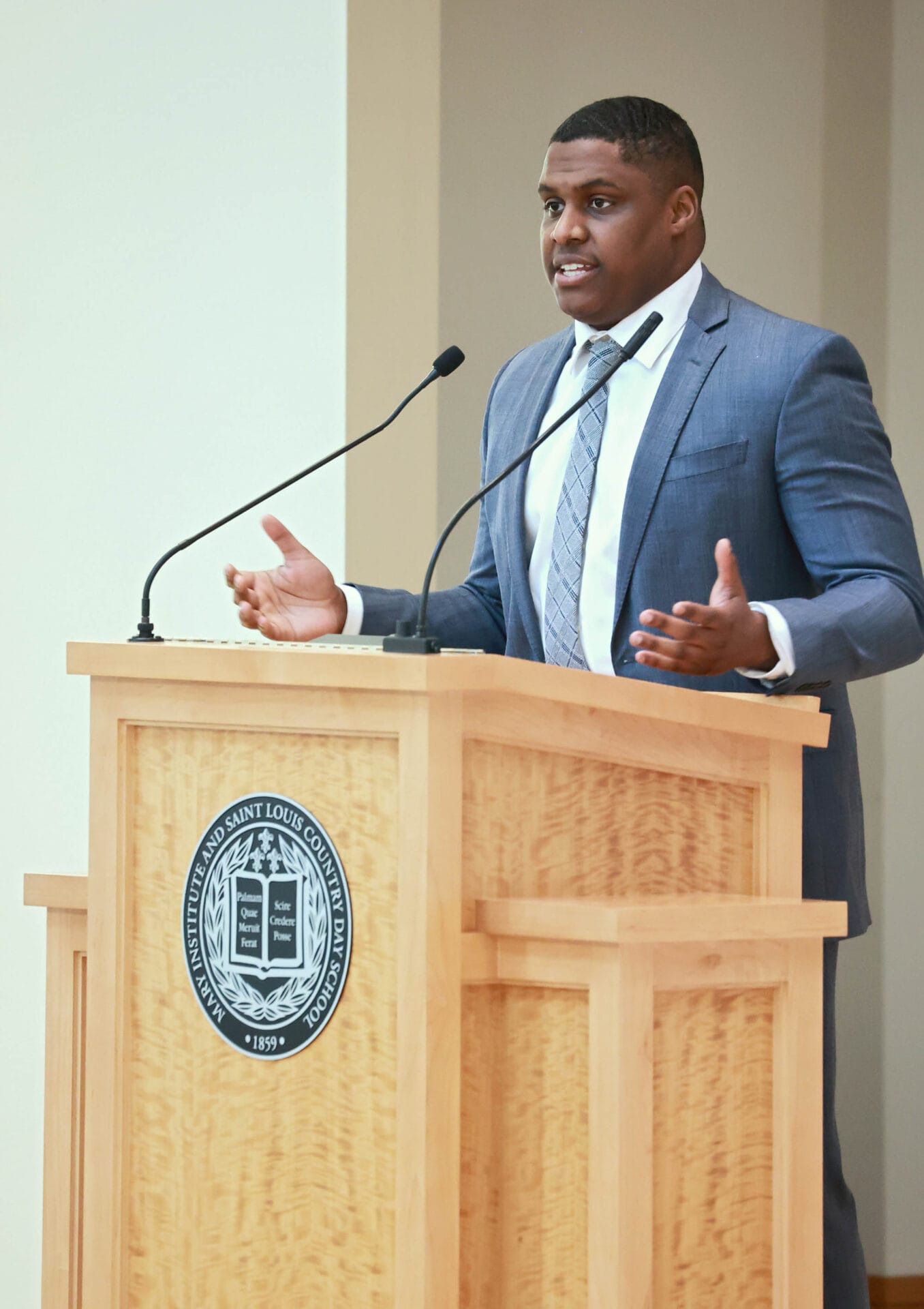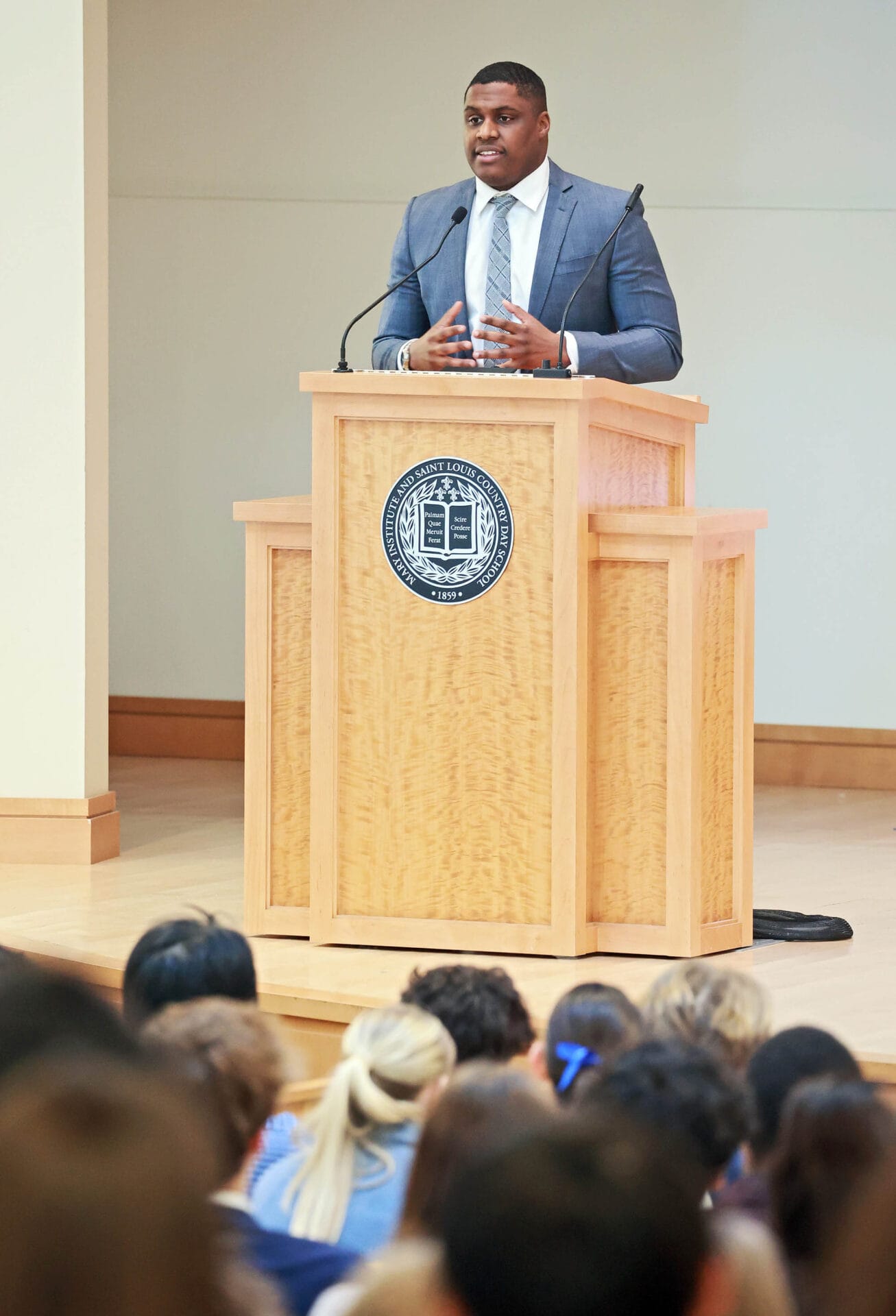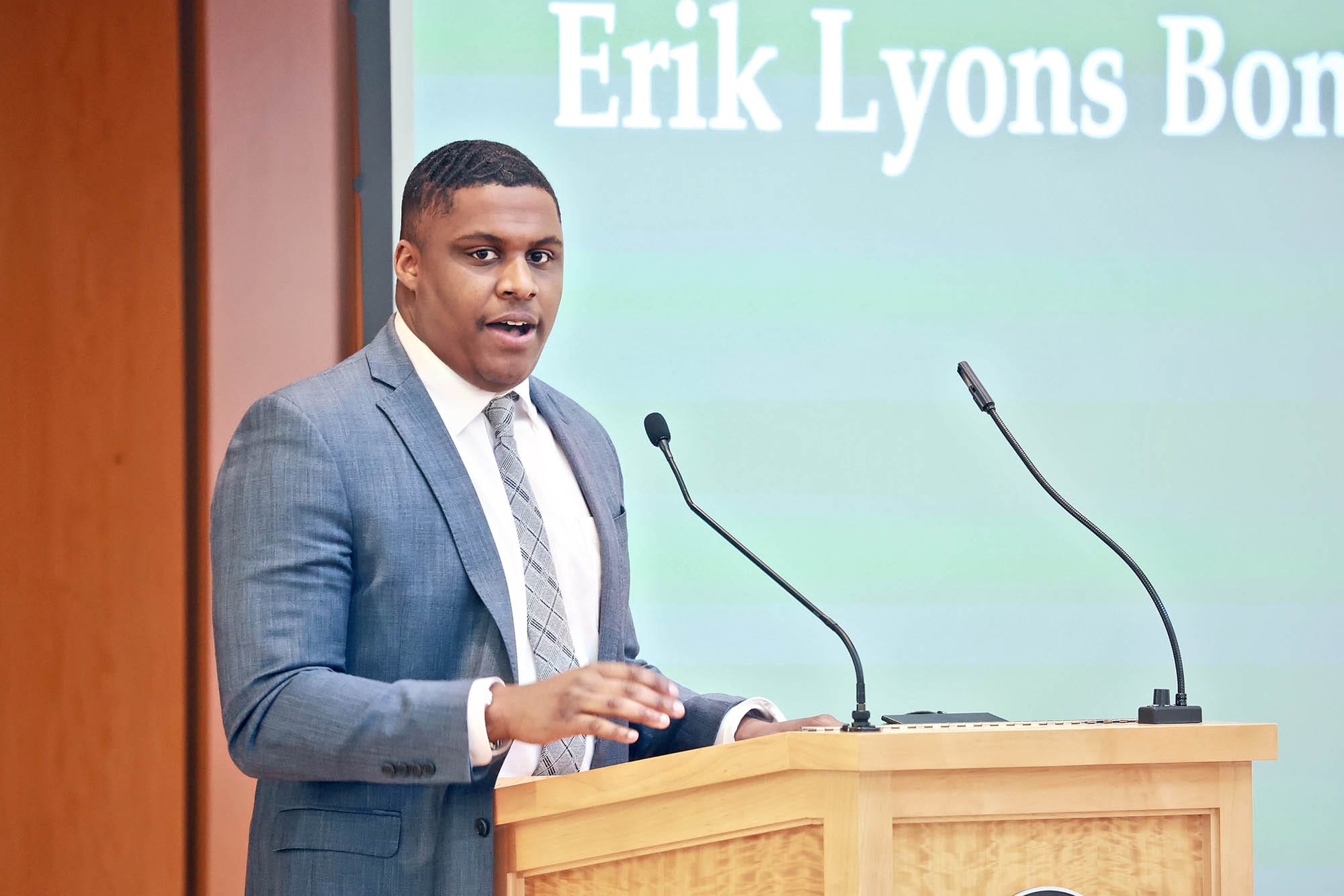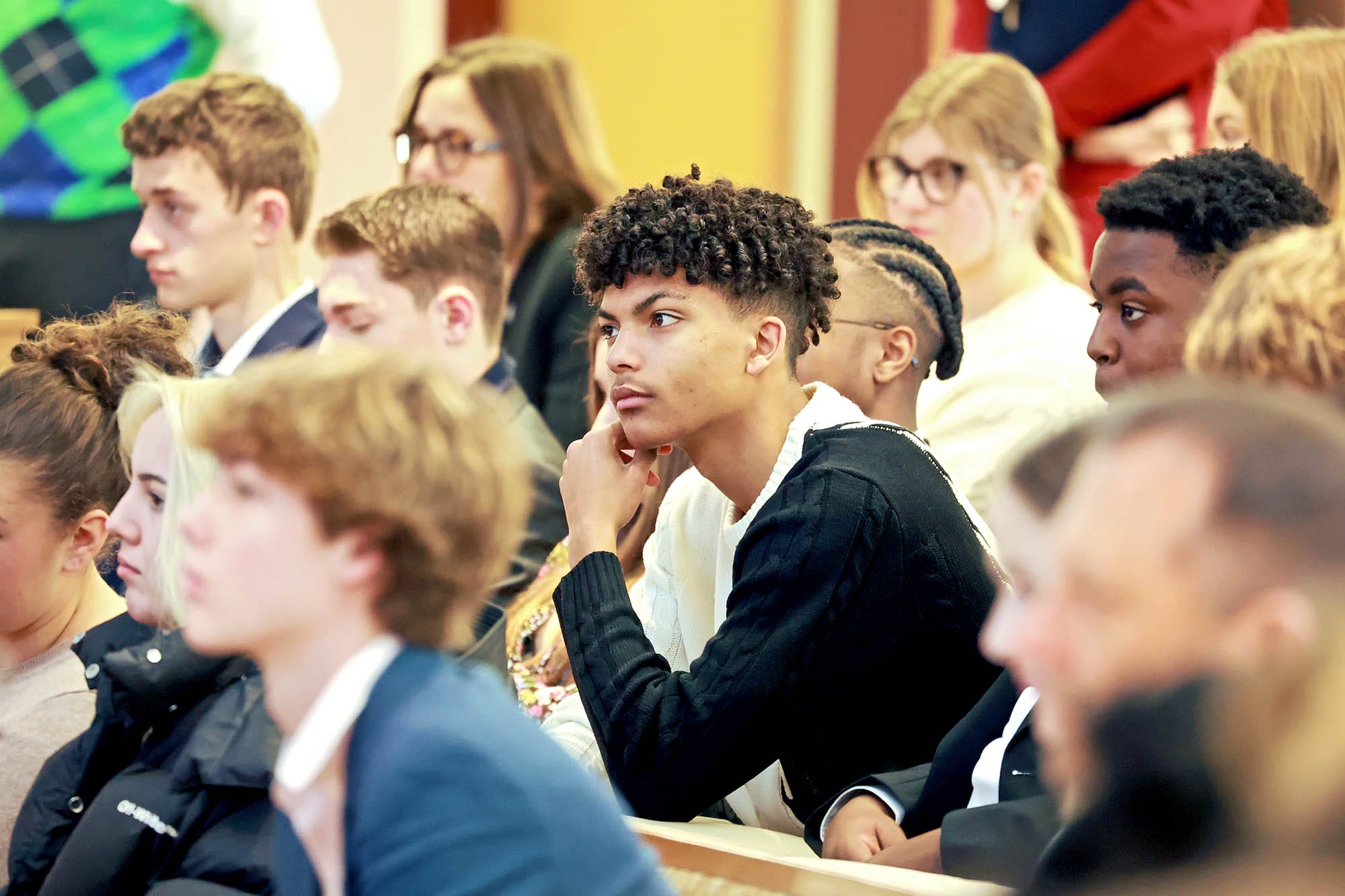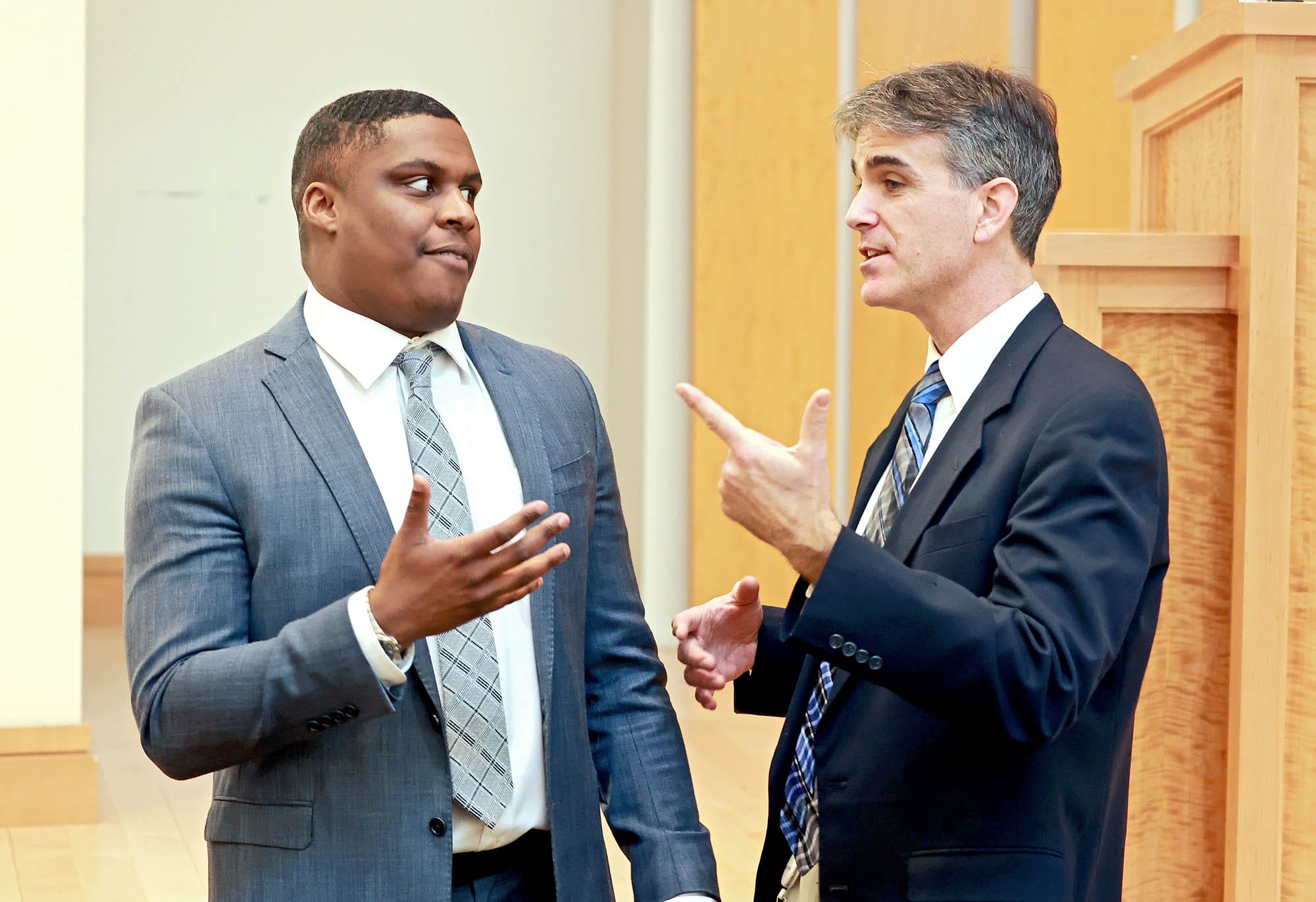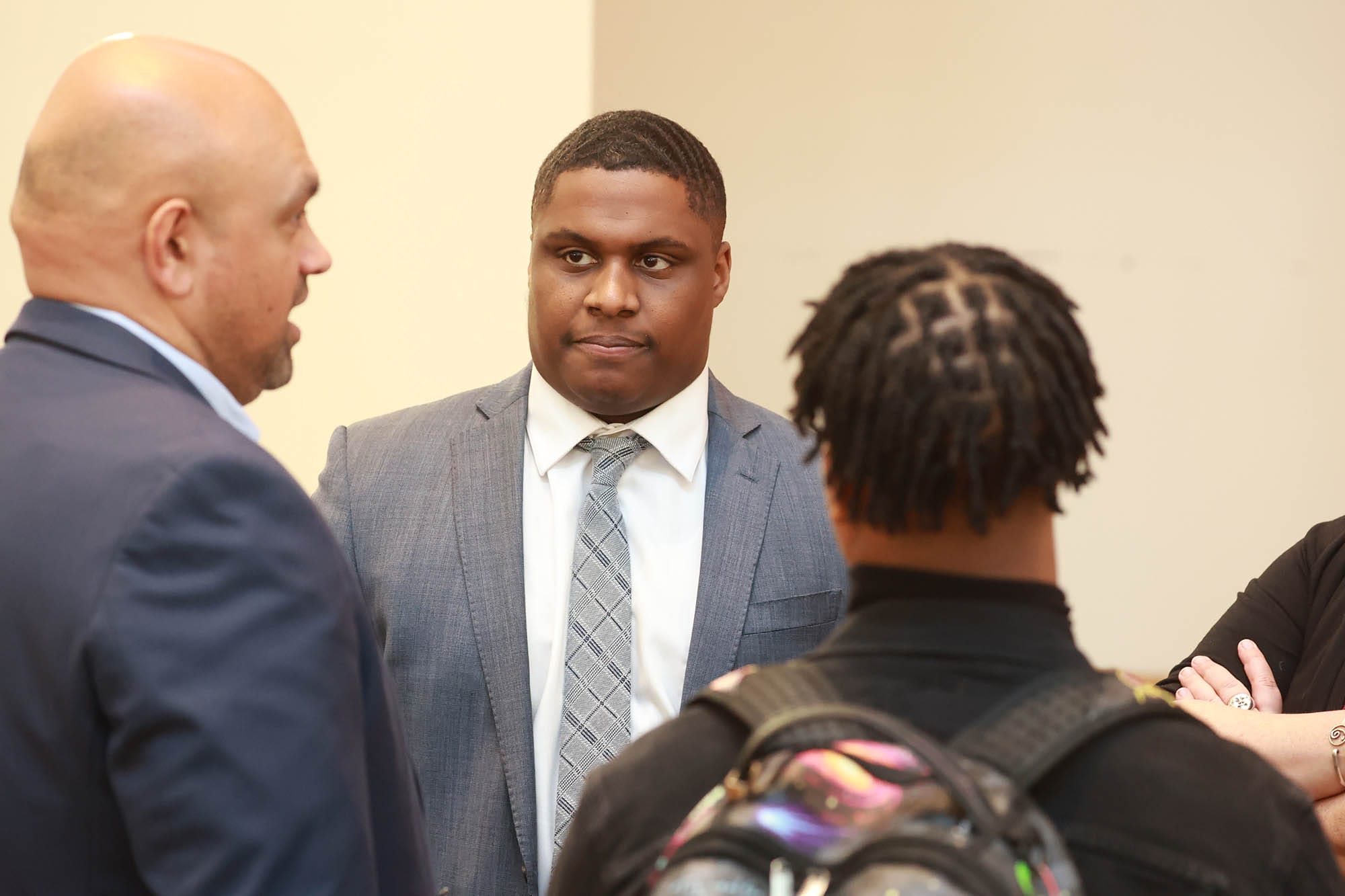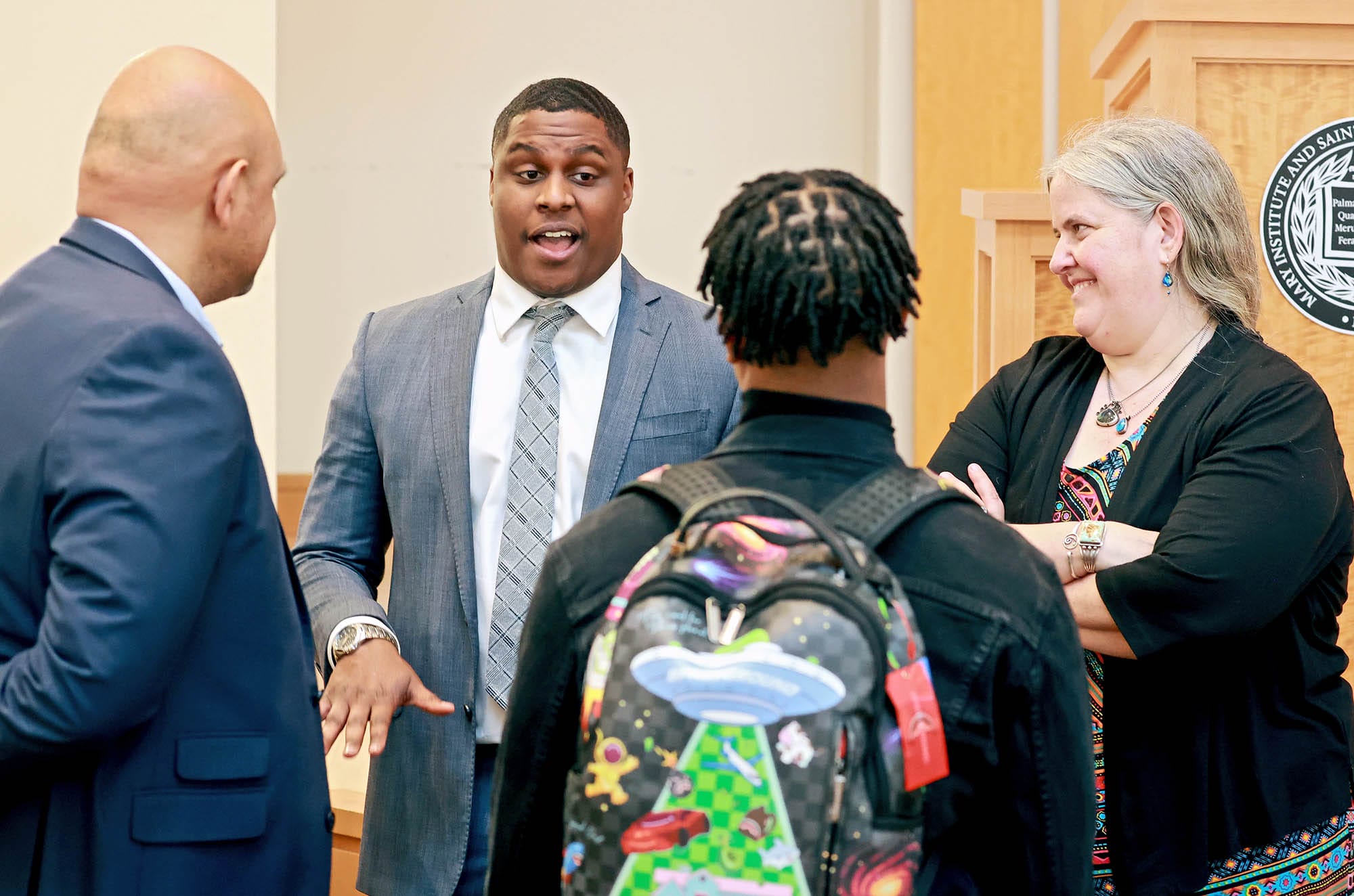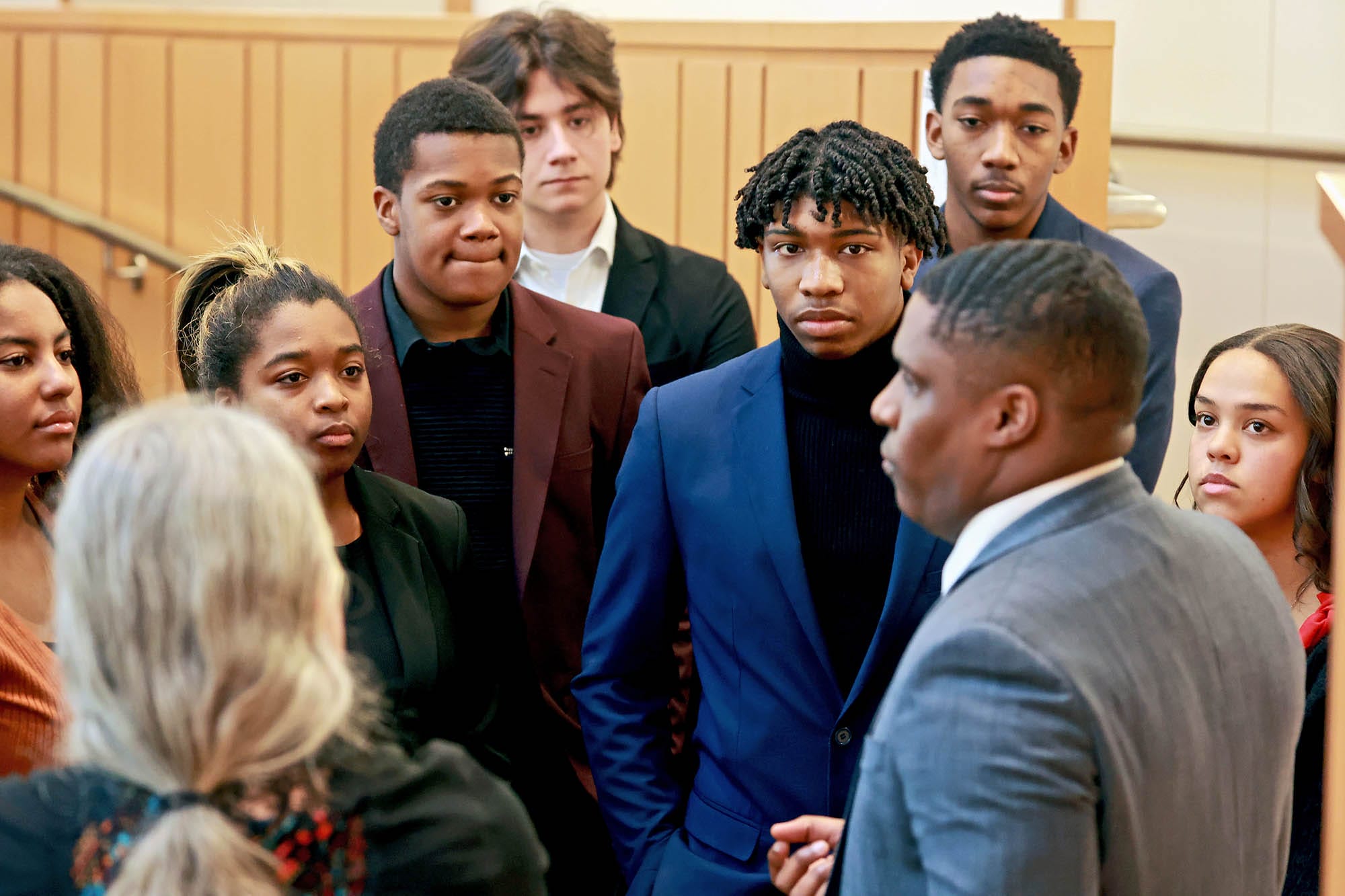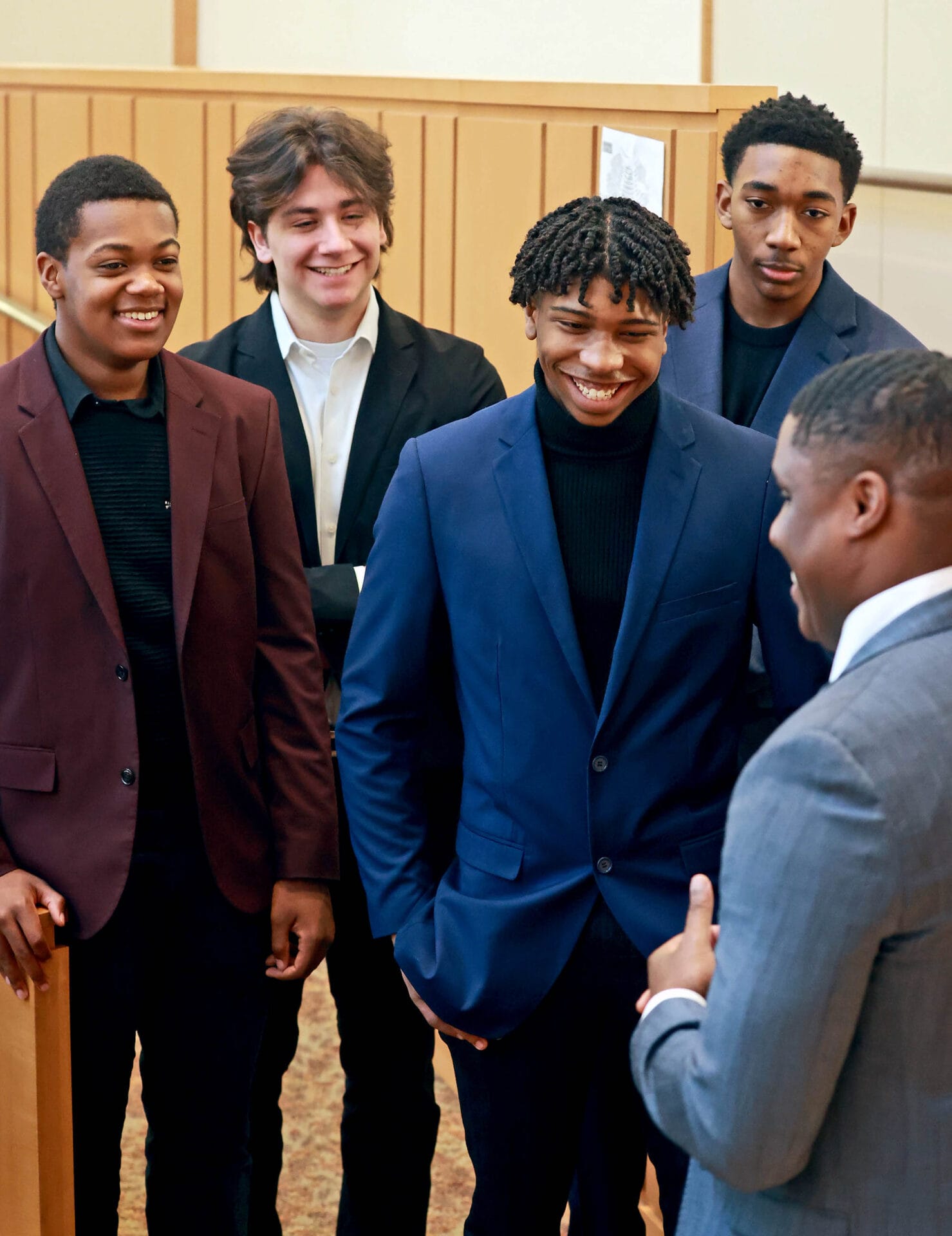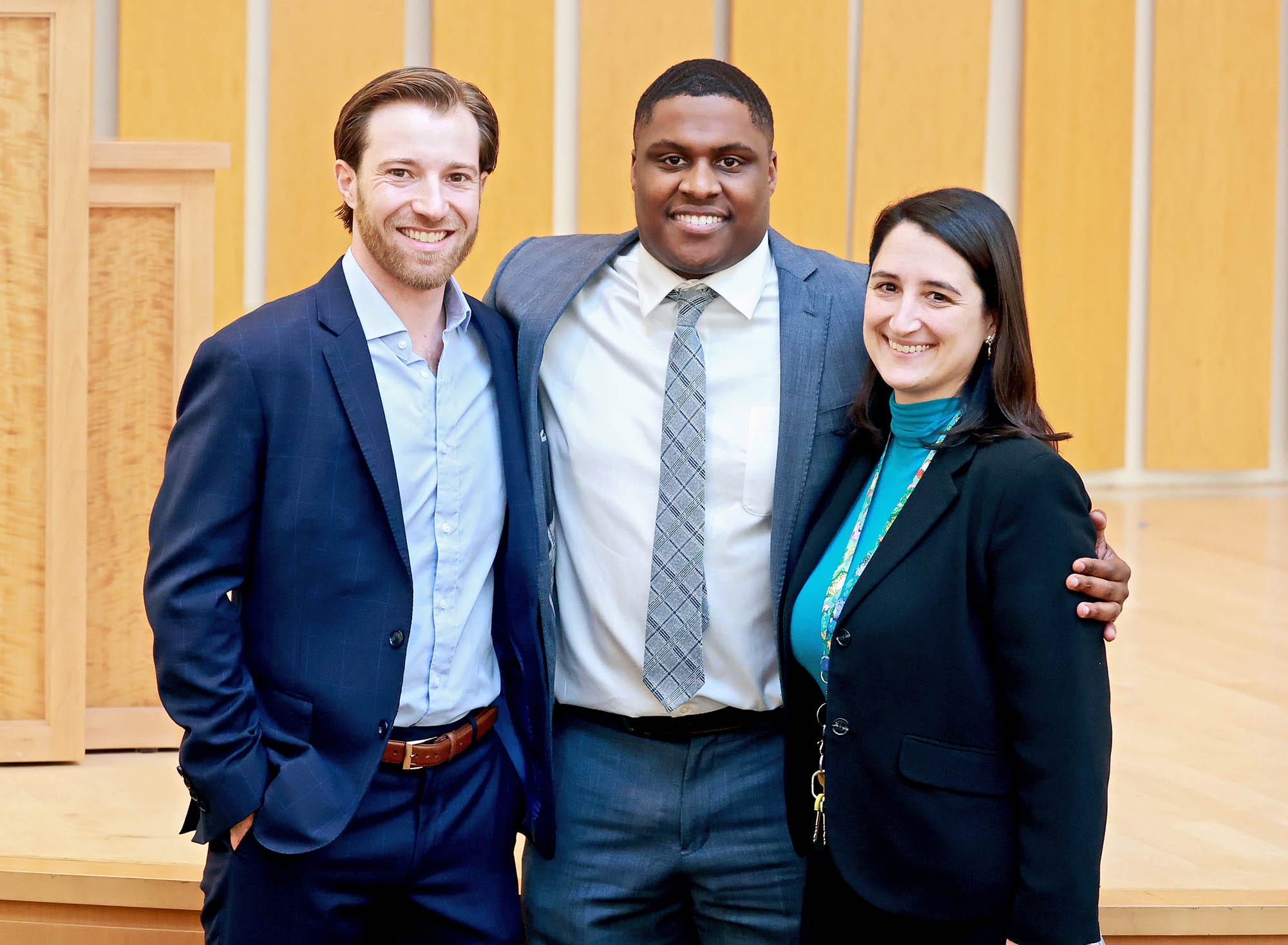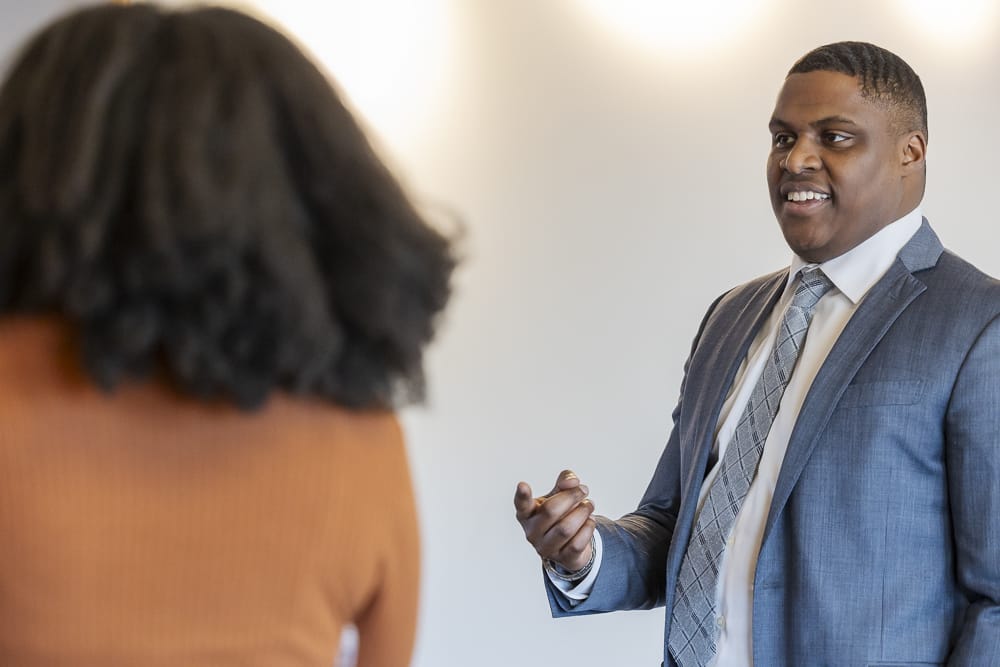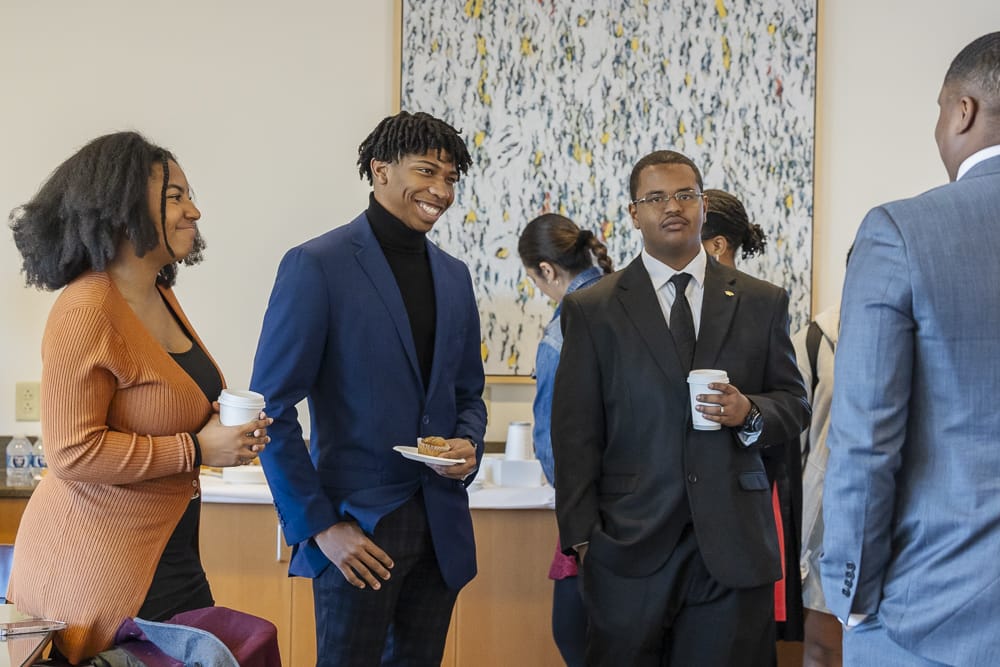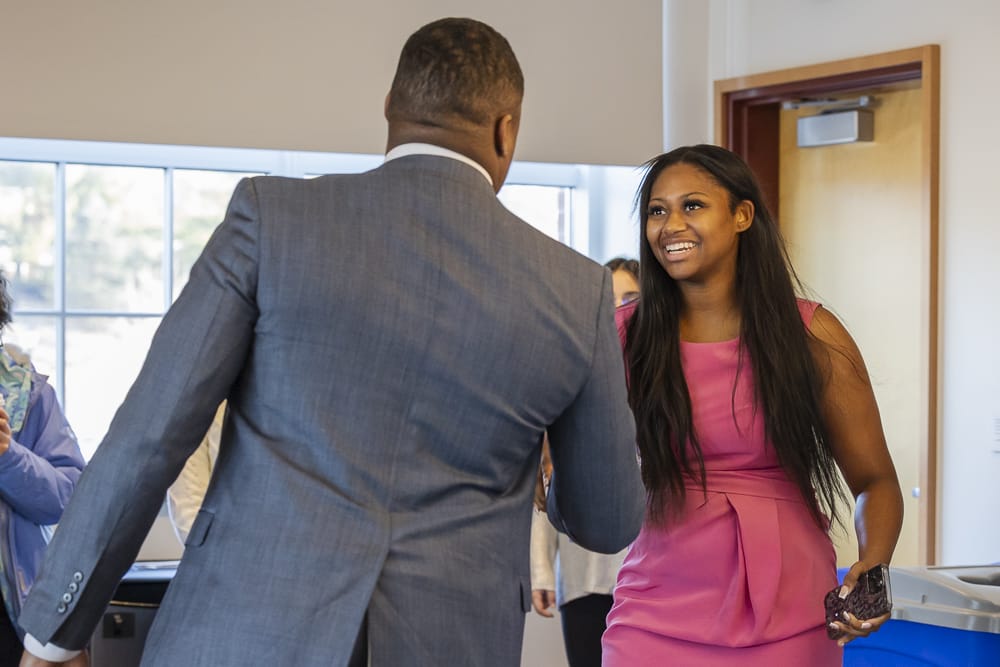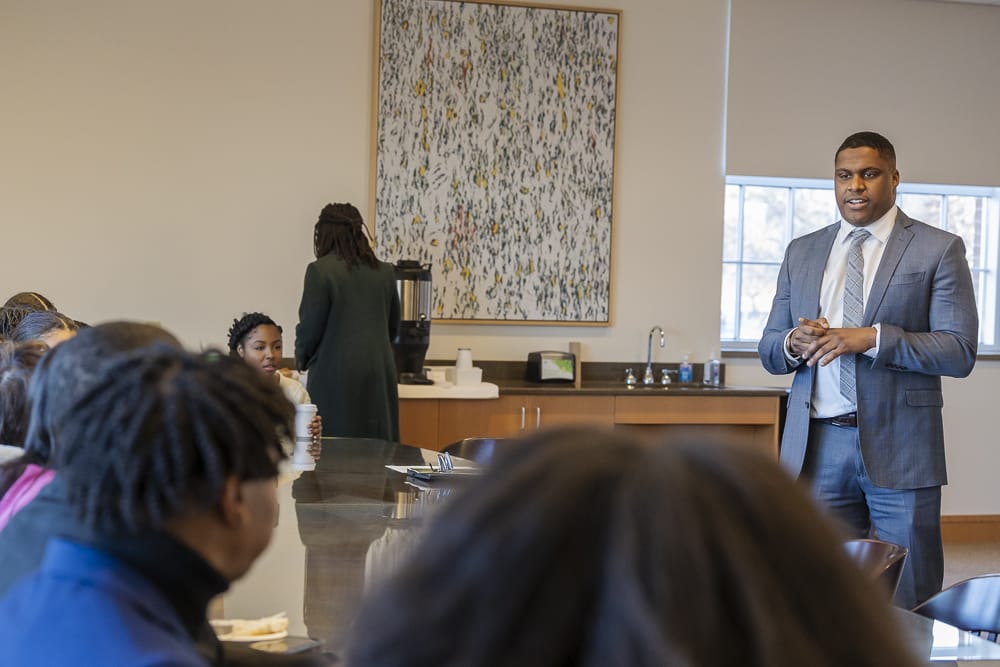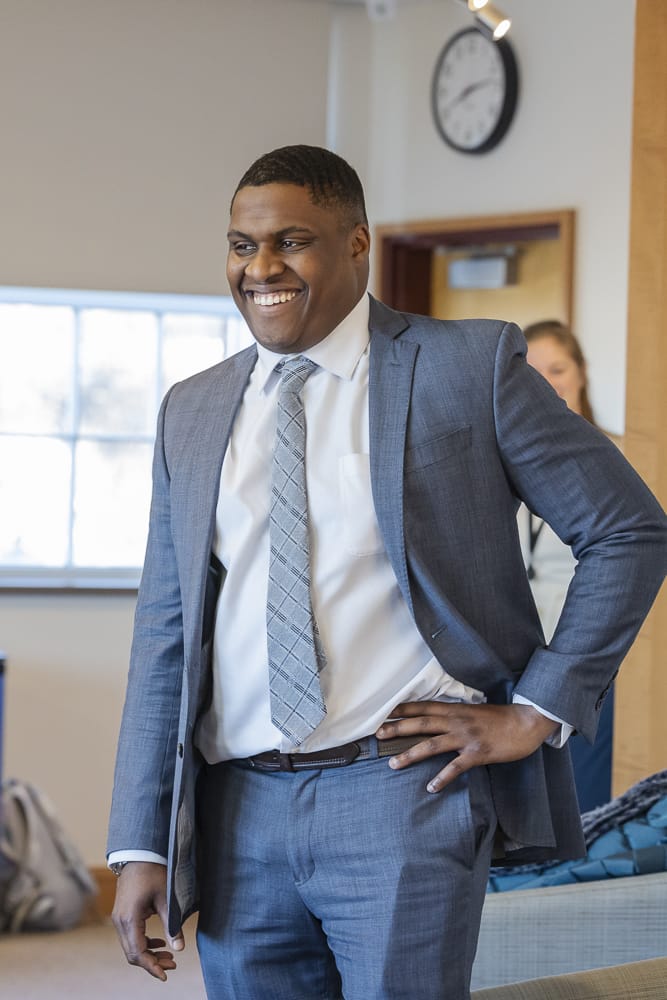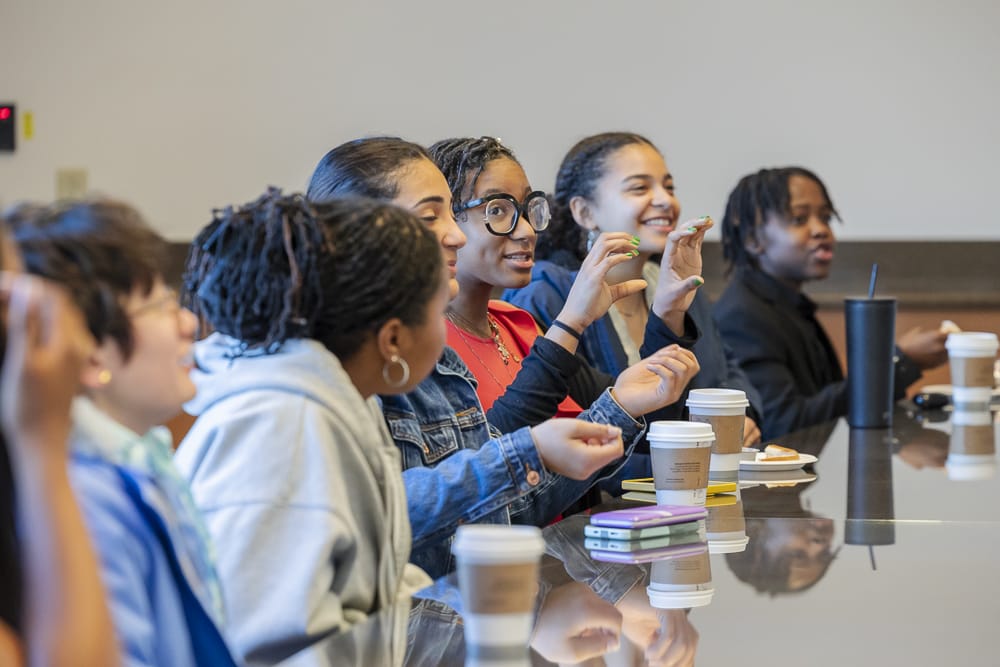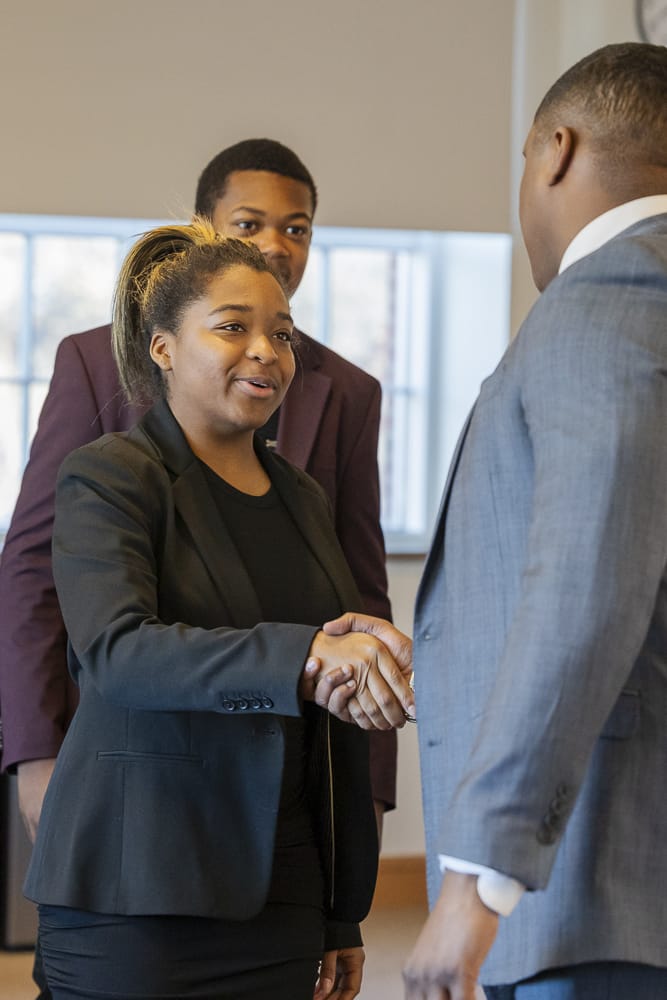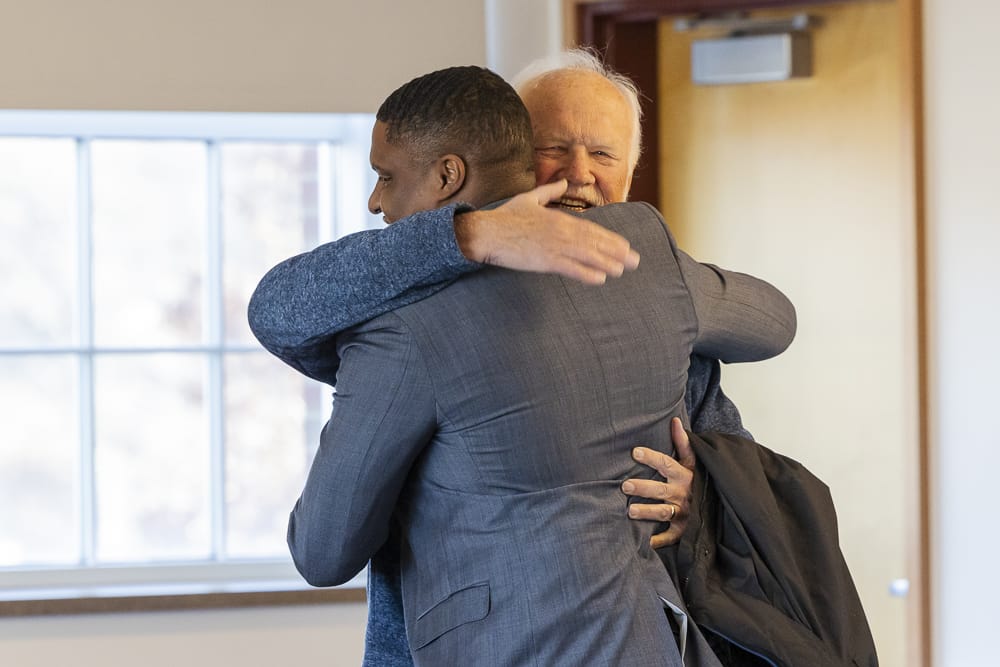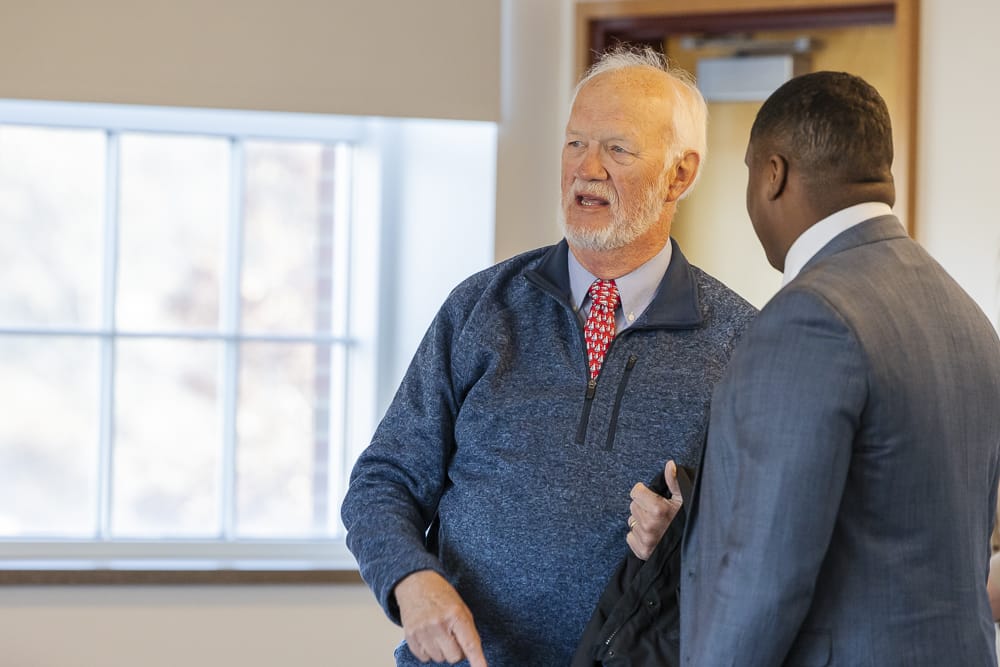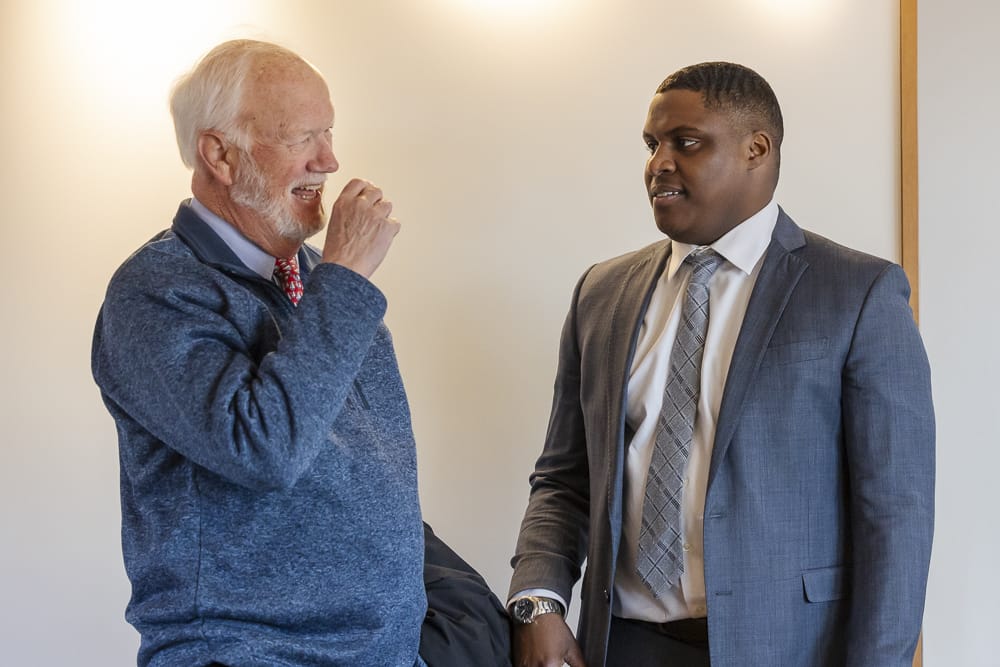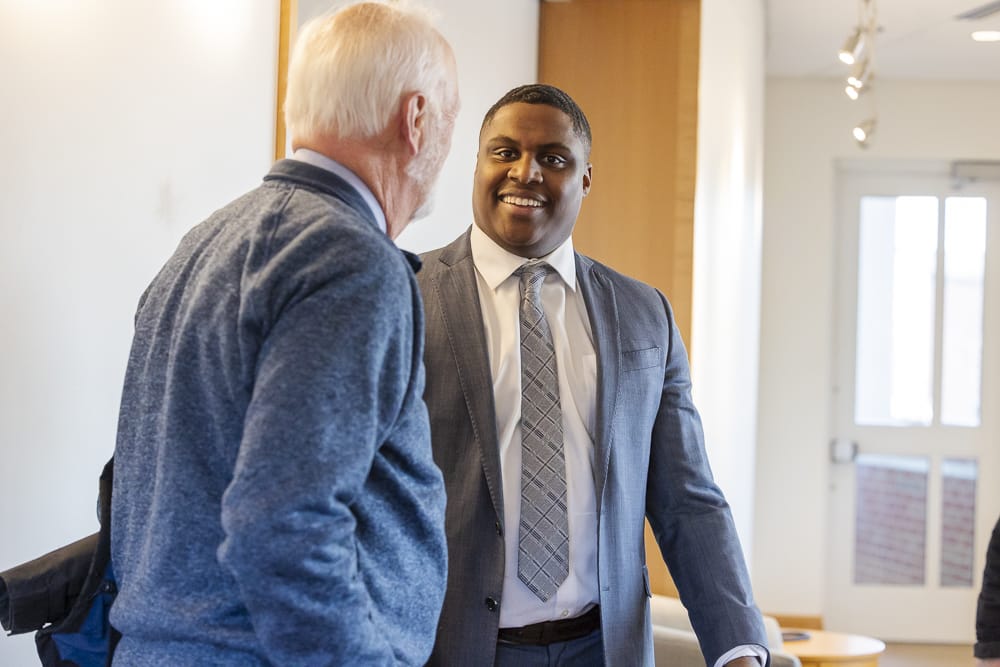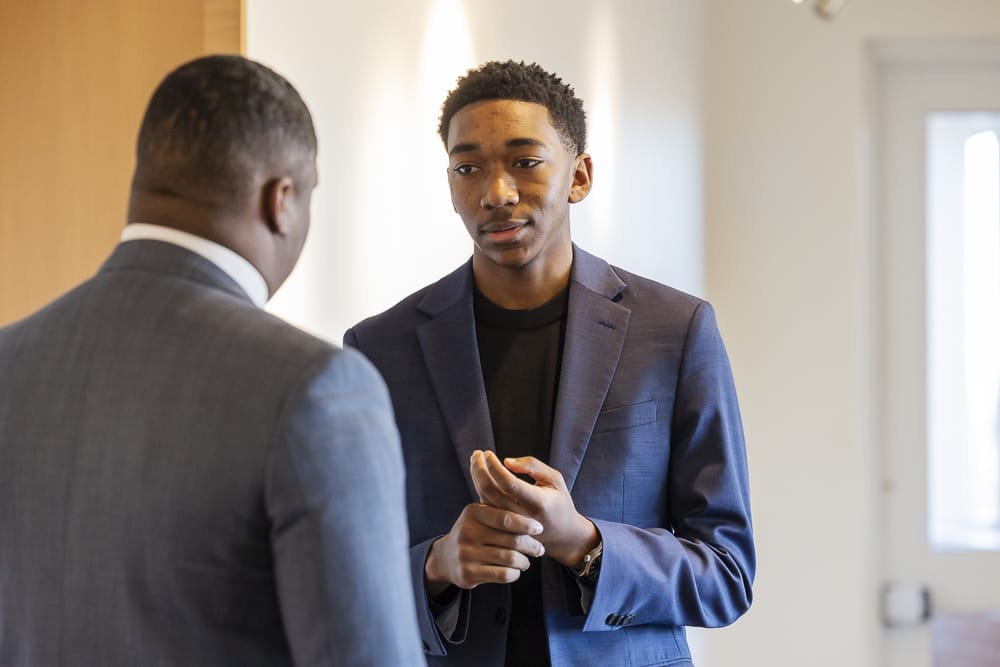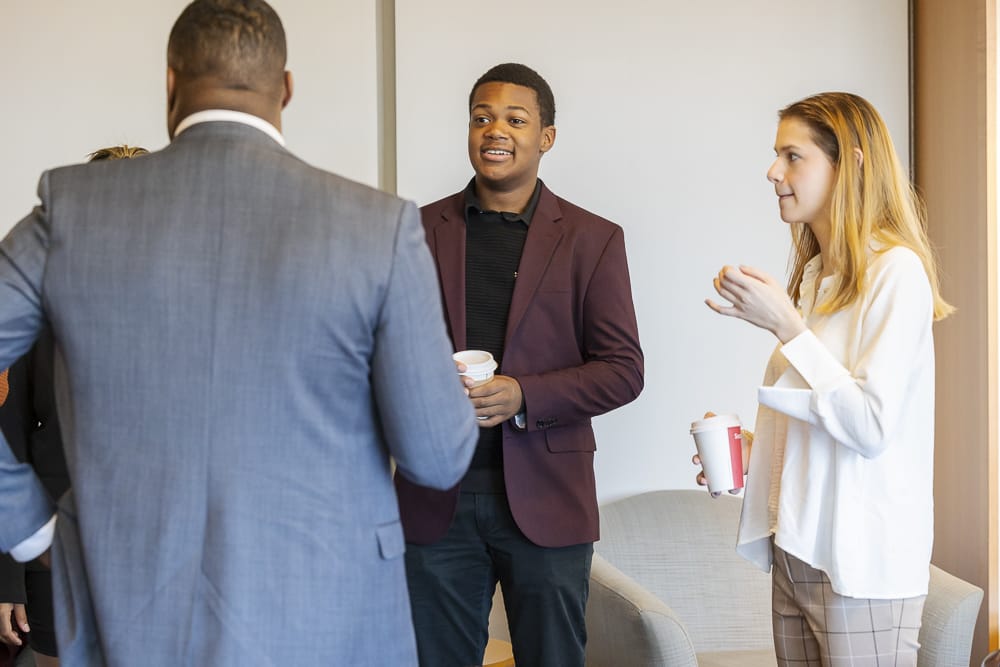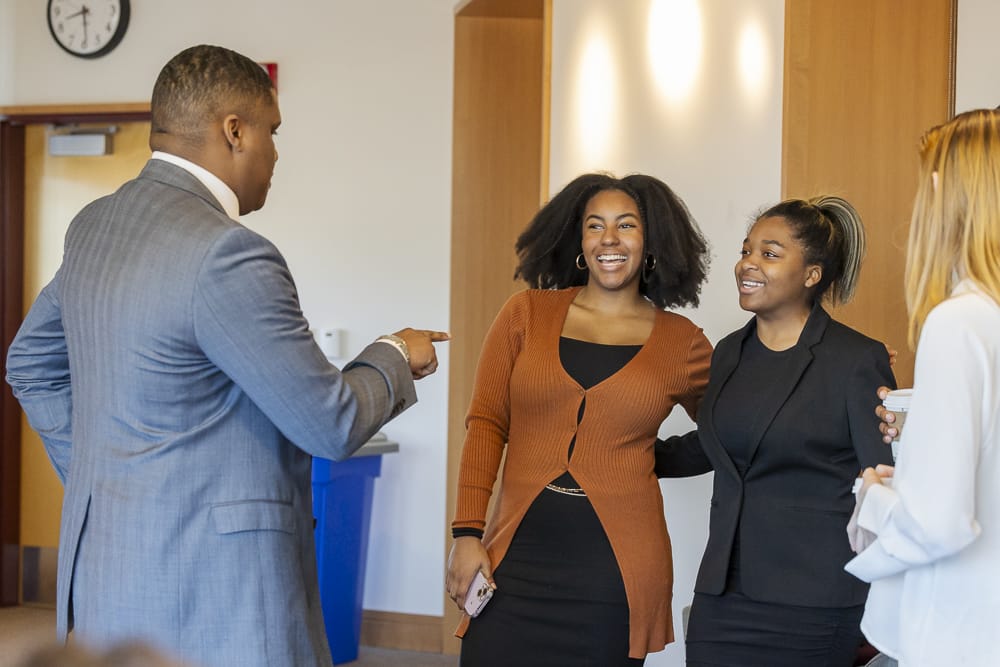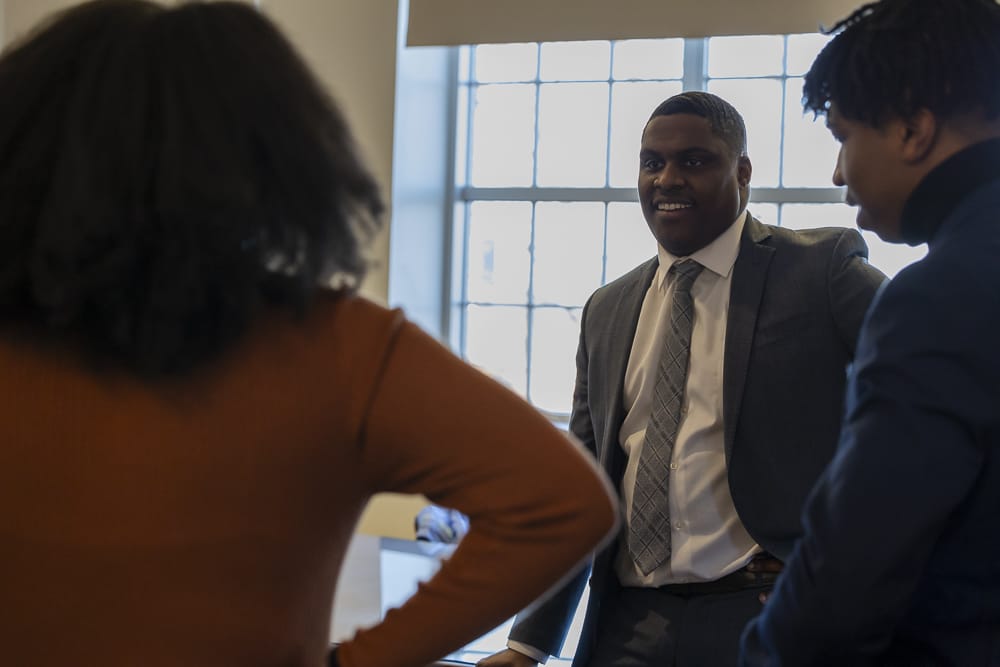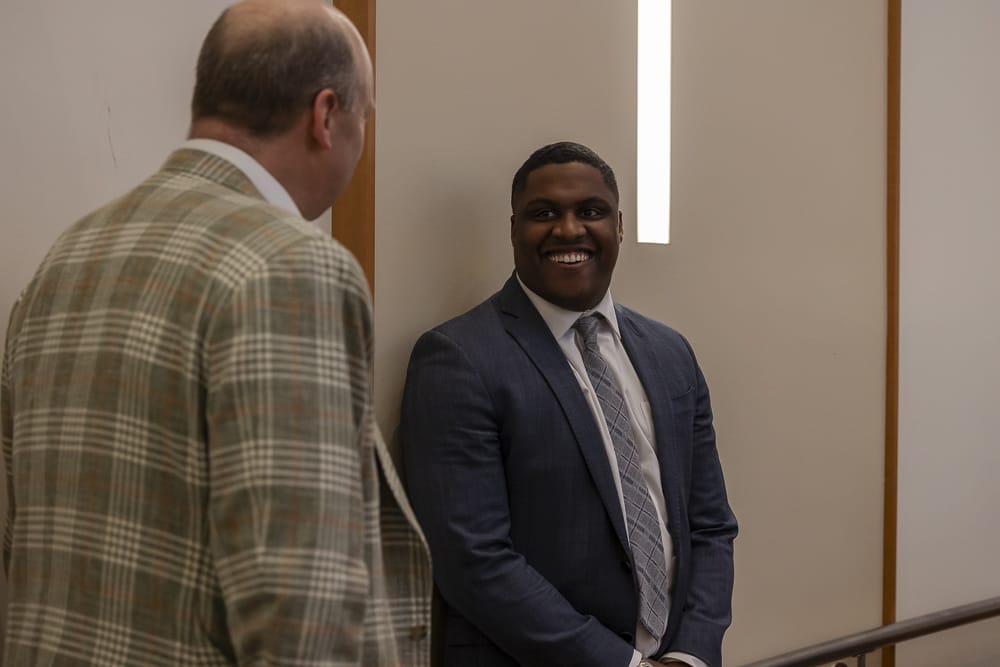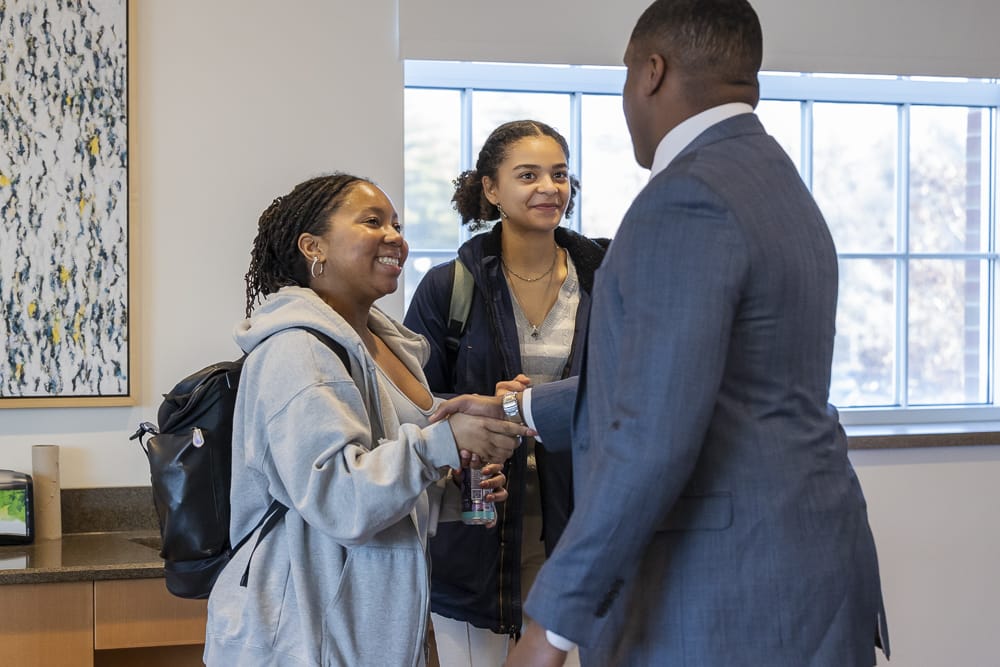Amir Muhammad ’24 and Tristan Williams ’24, representatives of our MICDS Black Student Union, welcomed Mr. Rhyan Henson ’10 to the stage in Brauer Auditorium. Henson is the 2024 Bond Lecture guest speaker. They began the Upper School assembly with an introduction:
As you may recall, every February, in observance of Black History Month, MICDS holds the Bond Lecture, in which a noted African American comes to campus to speak with our Upper School students as well as spend time in our classrooms. Past participants have included authors, lecturers, and civil rights leaders.
The Erik Lyons Bond ’77 lecture is named in honor of the first African American graduate to complete all eight grades at Saint Louis Country Day School. During his years at CDS, Erik Lyons Bond ’77 distinguished himself in scholastics, athletics, and student government. He served as student council president and captain of the varsity football team; additionally, his teammates selected him as the league’s most valuable player. Erik was named a National Merit Scholar, and he was also an accomplished musician and artist. He died unexpectedly in June 1984.
We are excited to introduce our 2024 Erik L. Bond Lecture Series speaker, Mr. Rhyan Henson, MICDS class of 2010. Mr. Henson grew up in the Ferguson-Florissant area in North County. He graduated from MICDS in 2010 and Butler University in Indianapolis in 2014 with degrees in Journalism and a minor in Spanish. After Butler, he started his career in journalism as a reporter. His career has taken him from Texas to back here in St. Louis, working for KSDK Channel 5 and now Washington D.C. In D.C., Rhyan is a National Political Anchor-reporter working for Gray TV. Gray owns 110+ local TV stations across the country, including KMOV Channel 4 here in St. Louis.
We are so pleased to have Mr. Henson here with us today to share his story. Please join us in welcoming Mr. Henson to the stage.
«When I graduated in 2010 I never thought MICDS would ask me to do a thing, ever, so I’m really excited to be here,» laughed Henson as he took the podium. Then things quickly got serious.
«How would you measure the value of life? Think about that,» he instructed.
Henson spoke first about the legacy of Erik L. Bond. «He was the best of us,» he said. Even though Bond passed before Henson and the students he addressed were born, «In a lot of ways, we know who Erik was. We know what it means to embody being an MICDS student or staff member every day.»
«Although he wasn’t with us a long time here on earth, his family and friends wanted to be sure he is remembered forever. How do you form a legacy?»
Henson spoke about the three characteristics that define a well-rounded member of the MICDS community: character, academics, and athletics. Bond personified all three and what it means to be a product of MICDS. His family and friends cemented his legacy by creating this lecture series, and through these speakers, encourage people to reflect on the value of life.
Henson measures the value of life by the positive impact we can have on others and the people’s lives we can change. «Before something is a legacy, it’s a reputation,» he shared. «Reputations are developed through relationships every day.»
As a reporter, Henson has seen people in their best moments, their worst moments, and even in their last moments. «I’ve seen people in their highs and lows, and that experience gave me an idea that you can tell what type of person someone is by looking at the people in their life.» He noticed that some people are surrounded by friends and family, love and support, in good times and in bad, while others have no one to celebrate with or to share burdens. He instructed students to consider the people surrounding them, who add value to their lives, who care about them, and who make sure they’re doing what they need to do. «The only real thing that matters is who is there for you mentally, physically, and emotionally,» he said.
He noted that life’s unpredictability means that perhaps today’s students will still be close with their current friends years from now, or perhaps they’ll drift apart and reconnect later. He shared a story about a classmate whom he barely knew in high school but connected with in Washington, D.C. years later. They reminisced and exchanged numbers, and now talk regularly and have become close.
«Everything you’re doing right now, the reputation you’re creating right now, will stick with you,» he said. «People will keep that in mind. Those things matter.»
How does Henson measure the value of life? «I measure it by the decisions, relationships, and reputation I make.» He explained that he had to work hard to get into MICDS, and then again once he was admitted. He credits good teachers with helping him along the way. He also had to work hard to get into Butler University, attending a different school freshman year, making the Dean’s List, collecting letters of recommendation, and applying to transfer. He noted that it was his reputation, the impression he made on his professors, that secured him the recommendations he needed to get accepted to the school of his choice. «Your reputation will be your legacy,» he said.
Henson also gives credit to family members who supported him throughout his life, and noted, «Everyone in here has someone helping you.» For faculty and staff, perhaps it’s a spouse making meals or a friend vouching for you to get hired, for students it’s parents paying tuition and driving them to school, or maybe a coach supporting you outside the classroom. «There are people who pour value into your life, who you have a relationship with because they care about you. Take the time—it doesn’t have to be today—to tell them thank you.»
Muhammad and Williams took the stage once again, thanking Mr. Henson and leading the student body in a round of applause. «On behalf of the Black Student Union, the Upper School, and Mr. Rainey, we thank you, Mr. Henson, for taking time to speak with us. Our community greatly benefits when alumni return to inspire and motivate us. Special thanks, also, to the Bond Family and the alumni office for holding this annual endowed lecture to honor the life of Erik L. Bond. We appreciate the opportunity to continue honoring his legacy and memory.»
«My biggest takeaways from his speech were the parts where he talked about our future and what we would do 10-plus years from now. Being a senior, this really related to me as no one knows what the future holds for them, but you are able to make the adjustments for a future you want,” said Muhammad.
Before the assembly, Henson spent some time meeting with the members of the Black Student Union, enjoying connection and community.
